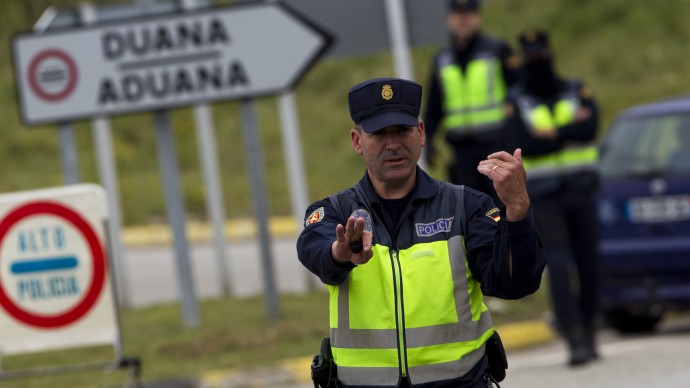
(BRUSSELS) — Free movement of people through 26 European countries with 400 million inhabitants is not only one of the European Union’s biggest achievements, it is also the most noticeable for citizens and businesses alike; 60 percent of Europeans consider it as the most positive outcome of the 50 years of European integration. In practice, it means citizens and residents can move freely without passport controls in a great deal of Europe, in an area spanning more than 4 million square kilometers, from Finland in the North to Spain in the South, from France in the East to Greece in the West. In exchange of this arrangement, checks were reinforced at the external borders of the Union.
It is this major freedom for Europeans that has now seriously been dented: on June 7, European Union governments decided that they should recuperate the power to re-establish controls at their national borders. A possibility to briefly do so already existed under previous arrangements, in case of “threats to public order” for events such as football matches and high-level international meetings to prevent hooligans and violent protesters to massively move around, but the newest decision is aimed at much longer term measures – up to two years – and, most revealing, it clearly targets migrants.
The question of migration has often led to hot debates between European governments, mainly because frontline countries, such as Spain, Italy or Greece, which receive most of the migrants’ flows arriving from the South, regularly come under fire from fellow EU countries for letting too many people slip into the Union (and since there are no border controls, they can then travel anywhere in Europe). Southern countries, on their part, accuse other European countries of a lack of solidarity, saying they are left alone bearing the burden of dealing with the influx of people from abroad for the benefit of the entire Europe Union.
The question has surfaced once more since the beginning of the so-called Arab Spring which has led thousands of North Africans to try and reach Europe, fleeing a deteriorating situation in their own countries. A first row erupted last year between France and Italy, when Paris accused Rome of letting in too many illegal migrants mainly coming from Tunisia, and decided to re-establish controls at the border with Italy to prevent them from arriving in France. Today, it is Greece’s turn to be accused of failing to stop illegal migrants. This is believed to be the main reason behind the recent European governments’ decision; probably combined with a fear that the situation in Syria may also lead to a renewed migration flow into Europe.
The decision to allow for the reinstating of border controls by national governments is hence revealing the increasingly deteriorating situation asylum-seekers and migrants face when they flee to Europe trying to escape conflicts or poverty in their own country. In recent years, various repressive measures have been introduced across Europe which raise human rights concerns.
First, asylum seekers and illegal migrants are increasingly seen as criminals. Some countries have introduced criminal penalties for irregular stay or entry. Some also punish people who help irregular migrants. Yet, whereas these people may have illegally crossed a border, they have not committed any crime. Some flee persecution or war and hope to apply for asylum in Europe to be recognized as refugees; others are migrants, abandoning a life of poverty to seek a better future for themselves and their families. They deserve to be treated humanely, not only because international law gives them rights that ought to be respected, but for sheer moral reasons.
Second, migrants and asylum-seekers, including children, continue to be detained in large numbers throughout Europe. Yet, international refugee law and human rights law clearly states that as a general rule, asylum seekers should not be detained. Detention should only occur in truly exceptional cases, as a last resort measure. But more and more countries use it as a deterrent, despite the lack of evidence that detention deters people from migrating or seeking asylum. Greece is now accelerating the construction of prison-style centers, arguing that similar facilities exists elsewhere in Europe, like in France or Spain for example. Greece also started building a U.S.-style fence along some parts of the border with Turkey.
Third, more and more people drown attempting to cross the Mediterranean; according to Amnesty International figures, last year at least 1,500 men, women and children drowned struggling to reach Europe. The desire of some European countries to prevent “irregular migration” seems to have undermined safe and timely rescue at sea. Desperate people have been left at sea for days while countries argue about who should intervene and where they should be taken. In some cases, people died on boats while distress calls went unanswered. European governments seem only to care about cracking down on irregular migration, with no consideration for the lives of people.
Today, Europe is not only failing to respect the rights of migrants, asylum-seekers and refugees. Hostility is widespread and mistreatment often goes unreported. European Union governments give in to the fear of the “Other” propagated by far-right racist parties by being increasingly repressive, trying to reap political benefits in the process. They have found a convenient scapegoat to the economic crisis and an easy distraction from politicians’ own shortcomings.
The European Union likes to portray itself as having norms and fundamental values. But the way it treats its migrants shows something has gone terribly wrong. It should offer a haven for those fleeing dire situations and in need of protection; it should show solidarity with the people from North Africa and the Middle East who are trying to reshape their future after years of dictatorships often supported by European governments. The way the European Union treats migrants and would-be refugees is one of the main issues it will be judged upon by all these countries that look up to it as a model for peaceful coexistence.


